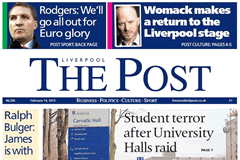Unemployment down, inflation down, predictions of growth up and Everton riding high in the Premier League playing a brand of football not seen at Goodison Park sine the halcyon ‘school of science’ days, 2013 has ended up being quite a decent year – but I’ll predict that 2014 will be even better.
The economy has turned the corner, business confidence has returned, and during the next twelve months that confidence will deliver enterprise, jobs and growth for UK Plc and for the North of England.
In the regions where Downtown operates, there is even more reason to be optimistic.
Leeds will host the Tour de France, a tremendous coup for the city region and an event that will elevate Leeds’ international standing and generate significant interest in Yorkshire. With the new Trinity shopping mall now open, and a 13,000 seat arena, Leeds will be looking to build its visitor economy, whilst maintaining its position as a leader in the professional and advanced manufacturing sectors.
Lancashire has been working hard to put in place a business support package that is private sector friendly and can deliver for ambitious companies in the county. Its BOOST initiative is the most comprehensive project of its kind that I have seen, and Lancashire County Council and the Local Enterprise Partnership deserve huge credit for genuinely listening to business and establishing a programme that will really work for Lancashire firms.
Manchester continues to deliver major regeneration and infrastructure schemes, and its plans for Airport City will take the city to another level again. Greater Manchester continues to demonstrate the importance of good civic leadership, private-public sector partnership that work, and the ability to avoid complacency and continue to drive forward with visionary strategies that build on past successes. I expect Manchester to lead the pro HS2 campaign and lobby for the acceleration rather than cancellation of a project that will benefit the North, but arguably Manchester in particular.
Liverpool will host the biggest international business event the UK has seen since 1951. Max Steinberg and his team at Liverpool Vision are organising a six week jamboree of activities that will take place in June and July of next year, with Downtown holding a significant series of high profile events during the International Festival of Business’ ‘Cities & Enterprise’ week. Over 140 countries are already signed up to IFB, and some top speakers have been booked. Again as a showcase for what the Liverpool city region has to offer, it couldn’t get much better.
As for Downtown, well 2014 see’s us mark our tenth anniversary. As you can imagine we have a whole host of special events, parties and celebrations in store for you, so watch this space.
Have a fantastic Christmas – and look forward to an absolutely fabulous New Year.







